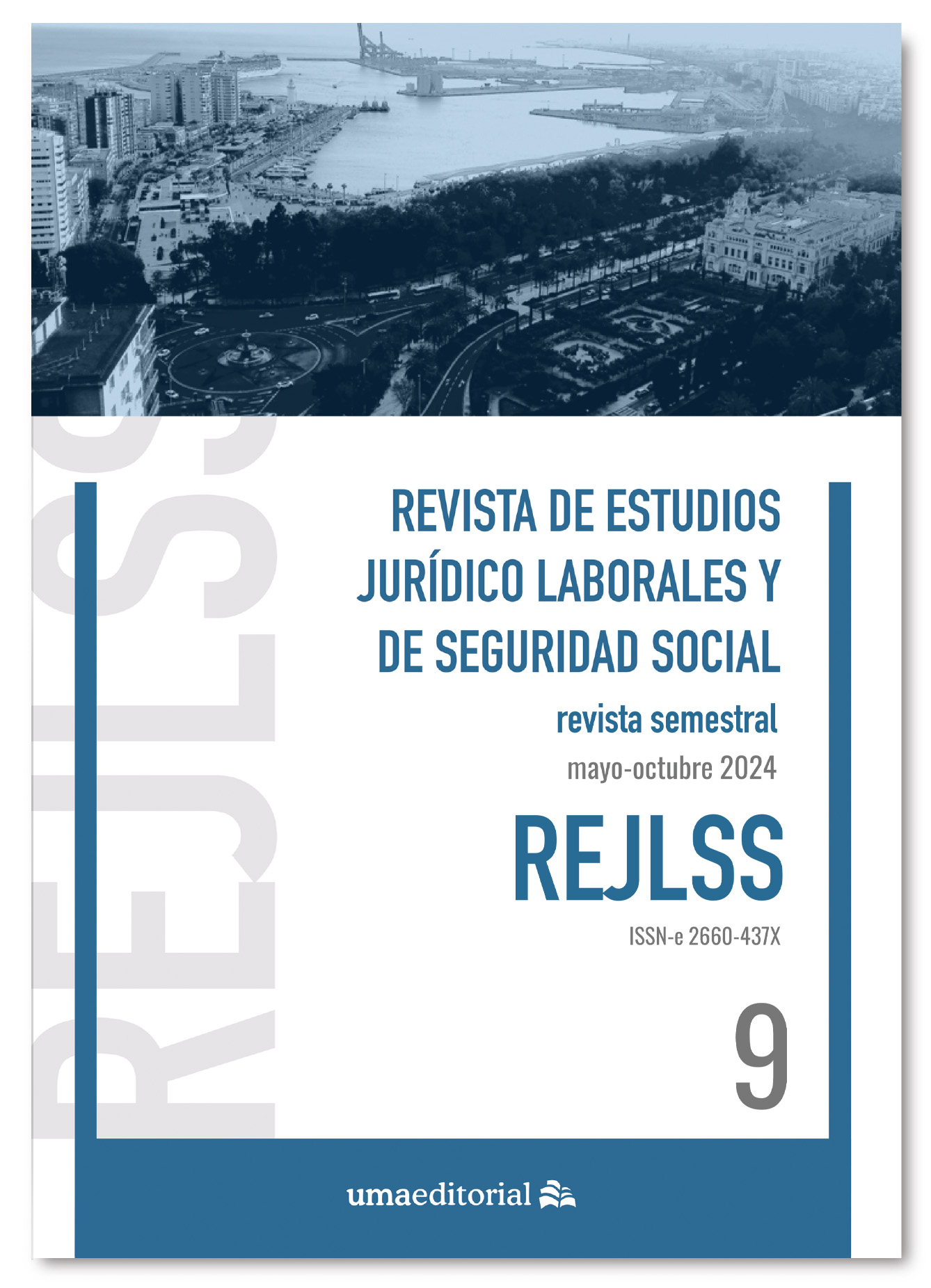On two (possible) breaches of international conventions on dismissal: worker prior defence and loss of representative status
DOI:
https://doi.org/10.24310/rejlss9202420059Keywords:
International Conventions, Dismissal, Prior Defence, Workers’ Representative, Representative MandateAbstract
Debates around unfair dismissal concern multiple issues: the amount and extent of compensation; whether reinstating a worker should be mandatory rather than a mere option; whether severance pay should be regarded as compensation or salary; and whether it should be related or not to the option of reinstatement. Yet, beyond these questions, other interrogations are hanging over the institution of dismissal which must be resolved and paid attention to. Indeed, they affect different aspects of the institution’s mechanisms and are specifically: the dismissed worker’s right to a prior defence and the loss of the representative status in the case of disciplinary dismissal. Both issues are today raising uncertainty because the judicial solutions currently being adopted may be contravening certain precepts of international texts, notably ILO Conventions No. 158 and No. 135. The aim of this paper was to analyse both problems in detail in order to draw the correct conclusions.
Downloads
Metrics
Publication Facts
Reviewer profiles N/A
Author statements
Indexed in
-
—
- Academic society
- N/A
- Publisher
- Universidad de Málaga. UMA Editorial
References
Beltrán de Heredia, I., “La condición de representante de los trabajadores se pierde en el despido disciplinario mientras se resuelve la sentencia judicial (STSPleno 25/4/2023)”, Blog Una mirada crítica a las relaciones laborales, 30 de mayo de 2023. Recuperado el 20 de abril de 2024.
Díez-Hochleitner Rodríguez, J., “Artículo 31. Prevalencia de los Tratados”, en AAVV, Comentarios a la Ley de Tratados y otros Acuerdos Internacionales (Ley 25/2014, de 27 de noviembre), Thomson-Reuters, Pamplona, 2015.
García González, G., “La audiencia al trabajador en el despido disciplinario: una relectura del ordenamiento jurídico interno a la luz del Derecho internacional”, Trabajo y Derecho, núm. 109, 2024.
García Murcia, J., “Estructura de la representación de los trabajadores en la empresa”, Revista de Trabajo y Seguridad Social. CEF, núm. 444, 2020.
Goerlich Peset, J. M., “(Re)descubriendo el control de convencionalidad: ¿activismo o autocontención judicial?”, Labos, vol. 2, núm. 1, 2021.
Goñi Sein, J. L., “La negociación colectiva española como instrumento para cumplir con lo previsto en el artículo 7 del convenio 158 de la OIT”, Revista General de Derecho del Trabajo y de la Seguridad Social, núm. 36, 2014.
Jiménez de Aréchega, E., “La Convención Americana como Derecho Interno”, Revista del Instituto Interamericano de Derecho Humanos, núm. 7, 1988.
Molina Navarrete, C., “Actualidades y críticas del Convenio OIT n. 158 en los derechos europeos: ¿el renacer del sentido del límite jurídico a la libertad (de empresa) en favor de la seguridad (en el empleo)?”, Revista Internacional y Comparada de Relaciones Laborales y Derecho del Empleo, vol. 7, 2019.
Nogueira Guastavino, M., “El Derecho Internacional Social Europeo y los Convenios Fundamentales de la OIT: luces y sombras del proclamado control difuso de convencionalidad en España”, Revista del Ministerio de Trabajo y Economía Social, núm. 147, 2020.
Sanguinetti Raymond, W., “La reforma del despido y el derecho de defensa previa del trabajador”, Trabajo y Derecho, núm. 101, 2023.
Downloads
Published
How to Cite
Issue
Section
License
Copyright (c) 2024 Carolina Blasco Jover

This work is licensed under a Creative Commons Attribution-NonCommercial-NoDerivatives 4.0 International License.
In the Revista de Estudios Juridico Laborales y de Seguridad Social (REJLSS) we are clearly committed to a policy of open access to scientific knowledge (See Berlin Declaration).
Those authors who have publications with this journal accept the following terms:
This journal provides immediate free access to its content under the principle of making research freely available to the public. All the contents published in the REJLSS are subject to the Creative Commons license
Attribution-NonCommercial-NoDerivatives 4.0 International (CC BY-NC-ND 4.0)
Copyrights are of two kinds: moral and patrimonial. Moral rights are perpetual, inalienable, non-transferable, inalienable, unattachable and imprescriptible prerogatives. In accordance with Spanish copyright legislation, the authors who publish in REJLSS retain the moral right over their work, as well as the ownership of the patrimonial right, which will be transferred to the University of Malaga for its dissemination in open access.
The patrimonial rights, refer to the benefits that are obtained by the use or disclosure of the works. REJLSS is published in open access and is exclusively authorized to perform or authorize by any means the use, distribution, dissemination, reproduction, adaptation, translation or transformation of the work.
It is the responsibility of the authors to obtain the necessary permissions of the images that are subject to copyright.
Authors whose contributions are accepted for publication in this journal retain the non-exclusive right to use their contributions for academic, research and educational purposes, including self-archiving or depositing in open access repositories of any kind.
The electronic edition of this magazine is edited by the Editorial of the University of Malaga (UmaEditorial), being necessary to cite the origin in any partial or total reproduction.
The authors may adopt other non-exclusive license agreements for the distribution of the version of the published work (eg: deposit it in an institutional telematic archive or publish it in a monographic volume) provided that the initial publication is indicated in this magazine.
Authors are allowed and recommended to disseminate their work through the Internet (eg, in institutional telematic archives or on their website) before and during the submission process, which can produce interesting exchanges and increase citations of the published work.







19.png)
